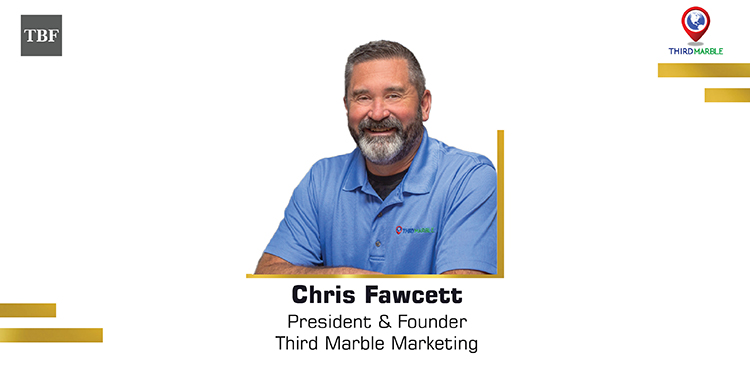Google is always evolving, but they have always remained committed to their one purpose: to provide the most relevant search results to Google users. Years ago, algorithms were simpler to grasp. Google’s algorithms for calculating organic search results now use more artificial intelligence. Google Ads’ bidding choices and algorithms have also grown significantly. Furthermore, Google Ads have become more complex and demand more investigation than they did a few years ago. Because the ordinary business owner typically does not have that amount of time, the need for professional Google Ads management has grown in tandem with these complications.
Google Ads are beneficial to small companies. Google advertising is perfect for small businesses who wish to reach out to certain demographics and track their ROI. If you understand how to use Google Ads, particularly local ad listings, they may be one of the most cost effective ways to get new customers.
Third Marble Marketing, a Richmond-based Google Ads Management and Search Engine Optimization in Richmond agency, considers small company owners critical to helping America thrive and grow. The company’s Google Ads Management services have helped thousands of businesses obtain top visibility on Google. Third Marble’s concept is that if it can help a small business owner, it is aiding the local economy and, by extension, the American economy. The company states, “We spent years developing our proven-processes to provide excellent results efficiently and affordably. This is how we help businesses grow so they can hire more people from their local community. “
Specializing in all things Google, the company is so hyper focused on Google that it knows every update and change so it can pivot if/when necessary. It makes it easier to continuously train the entire team. The company has a companywide training session at least once a week.
The Inception Story
It all started when the owner of Chris’ favourite local pizza shop asked him to build a website. He agreed, and after the website was up and running for a while, the pizza shop owner said he wasn’t getting any phone calls from his website. Chris told him he needed to do some online advertising. “If you build it, they will not come,” he said. “Having a website without advertising is like printing business cards and not handing them to anyone.”
A few weeks later, Chris received a call from the pizza business owner, who had some doubts regarding the contract he was going to sign. A salesperson from an internet advertising business approached the pizza restaurant owner and offered him $1200 per month on a 12-month contract for Pay per Click advertising. Chris couldn’t believe it — there couldn’t be so many pizza searches in one month for such a limited geographic region.
As a result, Chris urged the pizza shop owner not to sign the contract and began advertising the pizza restaurant’s new website on his own. Chris explored a variety of online marketing tactics, including search engine optimization, email marketing, social media advertising, and pay-per-click advertising on Google, Yahoo, and Bing. After only a few weeks, it was clear that there was only one genuinely effective technique — one that was both cost efficient and did not need hours of the owner’s work each week—Google Ads. For Yahoo and Bing, there were not enough clicks for such to make campaign management profitable. Facebook and email marketing took up too much of the owner’s time and didn’t result in many new consumers. Because Google Ads were providing 80% of all website traffic, and the pizza shop’s budget and resources were limited, they decided to discontinue all other online marketing efforts. So Chris began asking other local business owners whether they ever received business from their websites and if they had a good experience with an online marketing company. Their experiences differed, but they all agreed on one thing: “No.” So he began promoting a few more small businesses online with Google Ads, and the results were similar to those of the pizza restaurant – more new consumers and a favourable ROI.
Chris left his job to launch Third Marble Marketing after seeing an opportunity to start a small firm that might aid small business owners in the US and Canada. After a time, it became clear that there were far too many online advertising businesses out there preying on small business owners. In fact, the horror stories continue to come about “reputable” companies—including mis-billings, over-charges, lawyer calls, and the most frequently heard story: “I paid them all this money and they said they drove all this ‘traffic’ to our website, but we haven’t gotten one phone call yet.”
So Chris vowed to make Third Marble Marketing a resource to help small, local business owners grow their business by providing an affordable internet marketing strategy that effectively generates customers, NOT “traffic.”
The Visionary behind Third Marble Marketing
Chris Fawcett is the President and Founder of Third Marble Marketing. As a recovering industrial engineer, he has always been concerned with efficiency and making things function better. It’s simply how his brain is wired. Growing up, he was always fascinated by pulling things apart to discover how they worked. When he was a kid, few of his toys survived very long. Chris was always trying to get them to go faster or soar higher. For example, he may inform you that when you connect Lego motors to a vehicle battery, they don’t last very long. Chris chose Virginia Tech since it was one of the finest industrial engineering colleges in the country. In the 1980s, Japan was out-manufacturing America, and Chris wanted to make a difference, which remains one of his primary motivations today.
He began working for a marketing firm that used cutting-edge technologies to improve their marketing selections after graduating. They immediately joined the ecommerce area in the early 1990s, which is how he got his start in internet marketing. Chris founded Third Marble in 2009 after working in multiple ecommerce professions from 1992 to 2009. He wanted to help the average American small business compete online.
What do we do?
Third Marble Marketing specialises in helping businesses rank on the first page of Google using Search Engine Optimization and Google Ads Management. With Google Ads, the team can assist customers with practically any budget, ranging from $300 to $20,000+ per month. The firm has worked on search, display, remarketing, shopping, and YouTube advertisements.
Third Marble Marketing focuses on local search engine optimization but can also assist clients with national and e-commerce websites. According to Chris, most agencies consider themselves project-focused. This usually turns everything they undertake into a “project.” Projects often entail the development of new procedures in order to attain the goal. So a project has a clearly defined beginning and finish point, but you have to pay someone to develop all of the stages in between, which entails wasteful meetings and talks and generally takes a long time to complete. Third Marble is concerned with “processes.” A process has a well-defined beginning and an equally well-defined end. He asserts, “Prior to Henry Ford’s assembly line, all cars were built by experts as if it was a project. Only a handful of people had to work on the project. Ford made manufacturing a car a process.” He further adds that this reduced the price of a car dramatically, and made the car affordable for the average American. This is exactly what Third Marble Marketing does, Chris continues. “Like Henry Ford, we are trying to make Google Ads and SEO affordable for the average American small business.”
Chris finds that the company’s and team’s efficiency is what sets it apart from competitors. Third Marble Marketing’s business is built around the Henry Ford assembly line concept. Chris asserts, “We have specific departments that perform specific tasks in accounts, which allows us to be efficient with our work, and keeps our overhead costs down, and keeps our pricing affordable for our clients.” He also adds, “We also have our pricing designed to just perform Google Ads management or SEO work, but if the client needs a little extra collaboration or help outside of those areas, we have options to make that happen for them too.”
Adopt the changes and Keep Updated
Google is always upgrading and changing; prepare your personnel to keep up with all of Google’s developments. Keep in mind that what works for one customer may not work for another. Clients, according to Chris, anticipate immediate results, which simply do not occur. He goes on to say that Google Ads is a database marketing tool that requires data, therefore a fresh new campaign has no data, so it takes time to collect enough data for the algorithm to make logical, predictable judgments and bidding changes. “Be sure to manage their expectations,” he adds.
As Chris states, “The more you spend, the better the results are. Clients can see results with modest budgets, but it takes longer to optimize the campaign for a positive ROI. The same concept applies here: more data means better decisions and better results. To get there faster, you need data, which means you need a healthy budget to create data trends. “
He also adds, “Know what people want, how they think, and how they search. The increase in voice search and digital assistants has increased the variety of search terms. Know how this affects how people search for your client’s products and services. “










